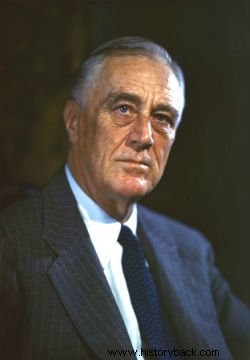Franklin Roosevelt he was the 32nd president of the United States. In that position, he was elected four times to govern the country from 1933 to 1945. He was the first president of the United States re-elected for four terms.
Three important moments that occurred during his government were:
- Fall of the New York Stock Exchange (1929);
- Attack on Pearl Harbor Naval Base (1941);
- World War II (1939-1945).
Biography

Franklin Delano Roosevelt was born January 30, 1882 in Hyde Park, New York.
The son of James Roosevelt and Sara Roosevelt, Franklin was born into a wealthy family of Dutch origin.
He was a cousin of Theodore Roosevelt, who also held the office of President of the United States, beginning in 1901.
He entered Harvard University in 1904. He later studied law at Columbia University in New York (1908). He married his cousin Anna Eleanor Roosevelt, with whom he had six children.
Before being elected president, he held several positions in the country's politics. He was a Democratic politician, Senator from the Dutchess District, Deputy Secretary of State for the Navy, and Governor of the State of New York.
His life was marked by a serious health problem, related to a paralysis of the body. That's because in 1921 he contracted polio. Even weakened, Roosevelt remained active in his political life.
He was elected President of the United States in the years 1932, 1936, 1940 and 1944. At the beginning of his administration, he focused on improving the economy, proposing the New Deal.
That's because when he came to power, the country was in a critical situation. The 1929 crisis bankrupted many companies and increased unemployment in a way never seen before.
After the attack on Pearl Harbor, the United States, which was not in World War II, changed direction.
The day after the attack, Roosevelt signed a document declaring war on Japan and the entry of the United States into World War II.
In 1944, he was part of the Yalta Conference, alongside Josef Stalin (Russian) and Winston Churchill (English).
This meeting was held with the aim of discussing the end of the war, which was practically won by this bloc. Because they were important and powerful figures, they became known as "The Big Three".
He died in Warm Springs, Georgia, on April 12, 1945, from a stroke. Thus, he lived to the age of 63 and could not fulfill his term until the end.
New Deal
In order to end the great depression that had occurred in 1929 in the United States, recovering the country's economy, Roosevelt proposed the New Deal.
The so-called “New Deal” was implemented when he came to power, between 1933 and 1937.
This agreement was based on the political-economic doctrine of Keynesianism, in which the State plays a leading role in the organization of a country. Furthermore, the New Deal was based on the concept of the Welfare State.
The New Deal represented a series of economic and social measures, which articulated state and private investments. The aim was to recover and heat up the country's economy, which had been affected by the stock market crash in 1929.
In the words of the politician:“We are all Keynesians now .”
Learn more:
- Crisis of 1929
- American Way of Life
- Good Neighbor Policy
Sentences
See below some famous phrases of the American president.
- “The test of our progress is not whether we add abundance to those who have much. And yes, if we provide enough to those who have little .”
- “The United States will have to lead. Lead and always be available to conciliate. America is the only great power that can make world peace last .”
- “People ask what is the difference between a leader and a boss. The leader works undercover, the boss works undercover. The leader leads, the boss guides .”
- “The only limits to our achievements of tomorrow are our doubts and hesitations of today .”
- “It is a good thing to demand freedom for ourselves and for those who agree with us, but it is an even better and rarer thing to give freedom to others who disagree with us .”
- “We can't always build the future for our youth, but we can build our youth for the future .”
